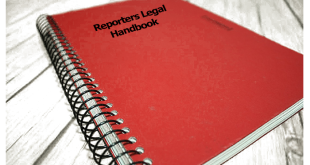7A: Breach Of Contract
If you intentionally or negligently reveal the identity of a source to whom you have promised absolute confidentiality, you may be subjected to a claim for breach of contract. While Nevada law has not made this determination, the United States Supreme Court has held that the First Amendment does not bar a lawsuit for breach of contract. Cohen v. Cowles Media Co., 111 S.Ct. 2513 (1991).
Because of the possibility of civil litigation for identifying a source, media entities should consider the adoption of a confidential source policy. This policy, which attempts to limit promises of confidentiality, does not allow outsiders to seek information from reporters. Under the Nevada Shield Law, whether or not a source is confidential is irrelevant; a reporter does not have to testify about “the source of any information procured or obtained.” NRS §49.275. Rather, it is designed to permit you to make a reasoned decision to reveal a source in unusual circumstances where that identity becomes a separate and legitimate story, or in defense of a defamation action.
A Suggested Confidential Source Policy
1.) Do not promise confidentiality unless you need to. If a source doesn’t request that his or her identity be kept confidential, don’t volunteer to do so.
2.) If a source requests confidentiality attempt to clarify exactly what they mean. You may wish to bring counsel in at this stage. One approach is to negotiate a written agreement which permits revelation of the source’s name in certain circumstances, such as in defense of a lawsuit. Another is to have counsel prepare an affidavit for the source which sets forth the source’s information under oath and which by its terms will only be revealed or used in certain defined circumstances.
3.) If the source does require absolute confidentiality, try to use the source as a lead to a source which does not require confidentiality. Using the source as a lead, try to compile evidence sufficient to prove the truth of the source’s information without using the source.
4.) If the source provides information regarding a criminal matter which might be in federal court try to determine if the information from the source would be available to federal authorities from other sources. If so, you may fall within the limited Branzburg privilege, supra.
5.) Make it clear to the source that a promise of absolute confidentiality is based on absolute truthfulness by the source. The source must understand that if he or she lies to you, your promise is not binding.
6.) Make it clear to the source that a promise of confidentiality does not mean that you will not reveal his or her identity to your Editor. Obtain the permission of your Editor before making such a promise but make it clear that the Editor is equally bound by your pledge.
7.) Once you have made a promise of confidentiality do not identify the source to any person other than your Editor.
8.) Be careful in your initial preparation of notes on any story involving a confidential source or sources. Keep notes absolutely segregated so that revealing notes about one person will not reveal any other information. Avoid any commentary or analysis in notes directly relating to the source so that even if the notes are provided, your thought processes are still separate.
These guidelines are intended as the basis for a newsroom confidentiality policy rather than as a direct model. You may wish to add to or modify these suggestions.
7B: Intentional Infliction Of Emotional Distress
Intentional infliction of emotional distress is a tort which is often thrown into a complaint for defamation. (Like an old ham bone in a pot of Saturday night’s pea soup, it adds lots of flavor, but not much substance).
Intentional infliction requires intentional or reckless extreme and outrageous conduct which causes severe emotional distress. Restatement of Torts (Second) §46. The Restatement requires conduct which is “so outrageous in character and so extreme in degree as to go beyond all possible bounds of decency.”
The tort has been recognized in Nevada in the case of Star v. Rebello, 97 Nev. 124, 625 P.3d 90 (1980), but the Court set an extraordinarily high standard. In essence, the plaintiff must show conduct intentionally causing severe emotional harm which is unjustified by any other legitimate purpose. Examples include practical jokes like causing someone to appear unclothed before a group of strangers or falsely informing a person that their spouse had been severely injured.
In Posadas v City Of Reno, 109 Nev. 448, 851 P.2d 438 (1993) the Court heard a non-media case which linked defamation with intentional infliction. Taken together with Branda v. Sanford, 97 Nev. 643, 637 P.2d 1223 (1981), the case could be read to hold that the question of whether conduct amounts to intentional infliction is one for a jury. However, in light of a holding in Star which indicates the question can be decided as a matter of law, the better interpretation is that when the conduct alleged can not be reasonably viewed as rising to the level necessary, the court can decide it in a Motion for Summary Judgment.
In Hustler Magazine v. Falwell, 485 U.S. 46, 108 S.Ct. 876 (1988), the Court held that a public figure could not avoid the constitutional limitations on defamation actions by alleging intentional infliction of emotional distress as a substitute or alternate claim.
While no Nevada case has decided the question of whether this State’s retraction statute provides protection against punitive and general damages in an intentional infliction (or invasion of privacy) case, based on the reasoning of Falwell, and on cases interpreting similar statutes in other states (especially California) it appears the statute’s protection should apply.
Taken together, Star and Falwell indicate limited problems for the press from the intentional infliction tort. As long as the publication is not designed to shock and harm the plaintiff, with no news value in mind, the tort is probably inapplicable.
 Nevada Press Association The best in Nevada journalism since 1924
Nevada Press Association The best in Nevada journalism since 1924


